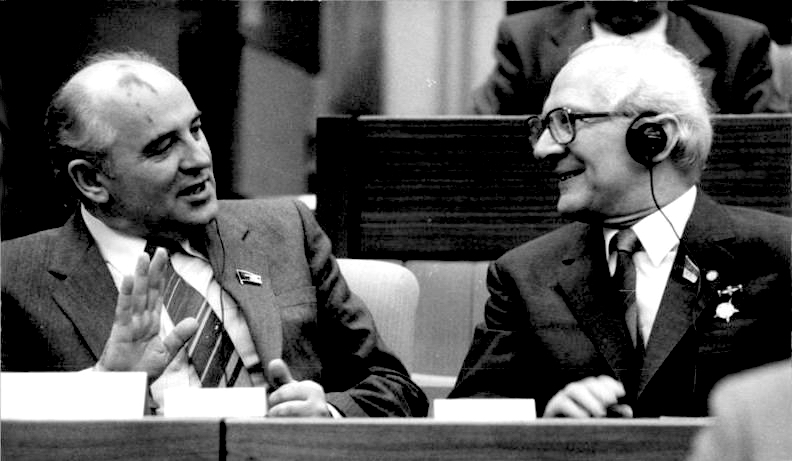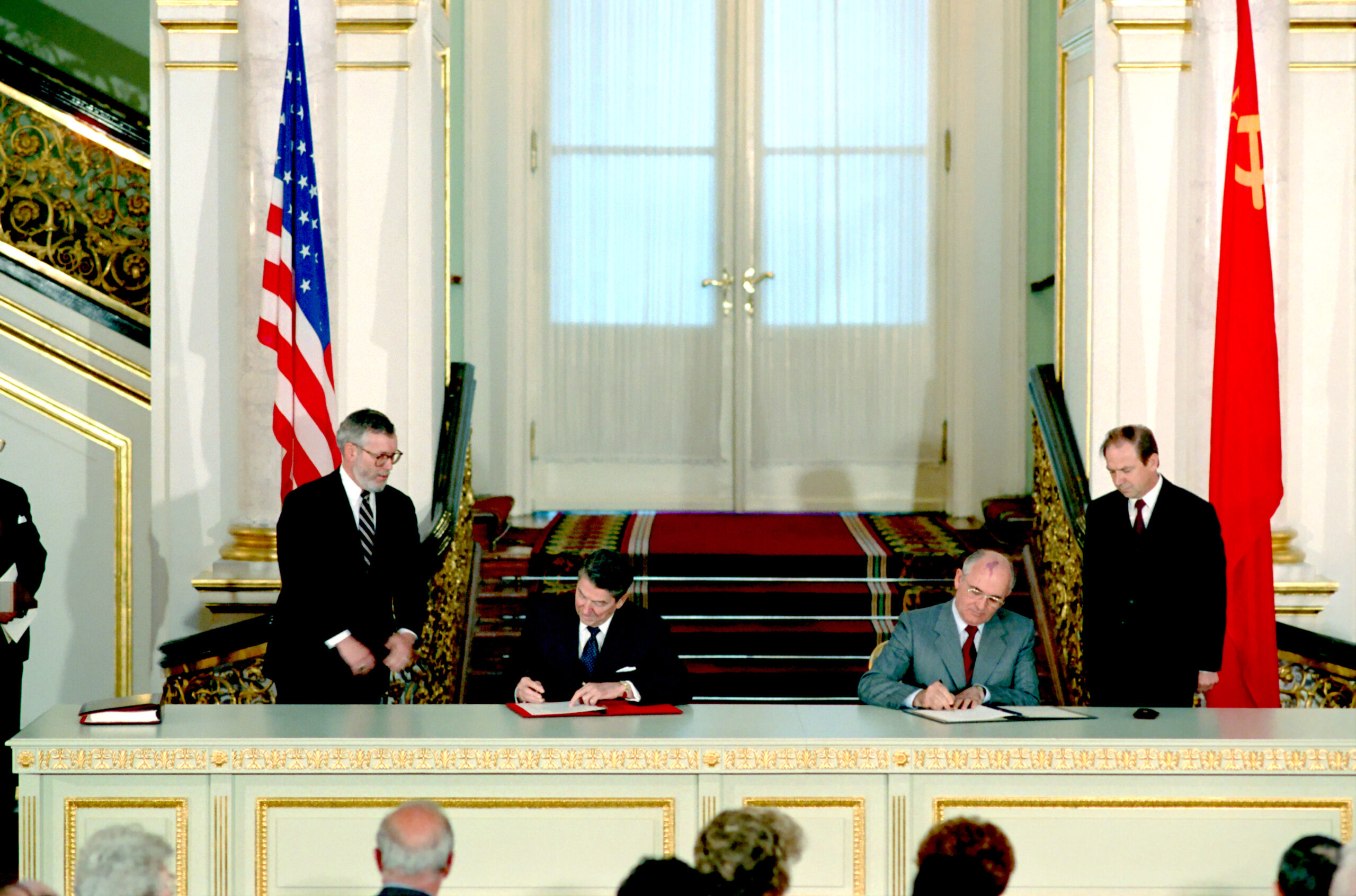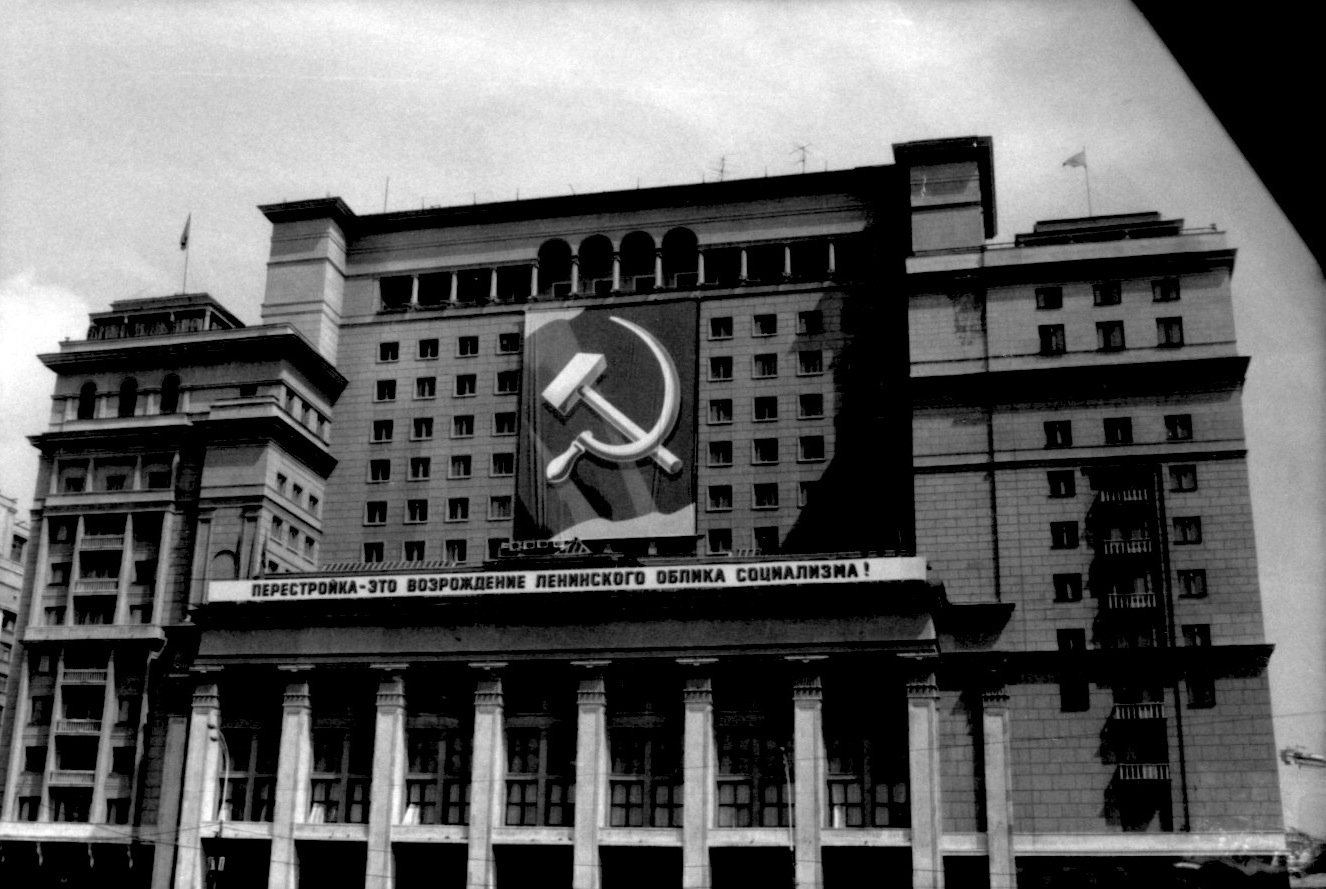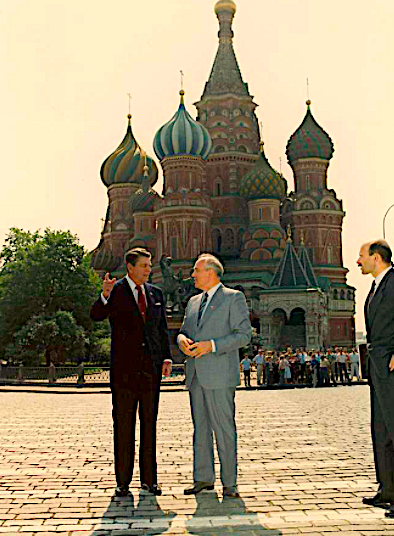In ways that he never intended, the first and only president of the Soviet Union shaped world history.

Mikhail Gorbachev, while serving as general secretary of the Central Committee of the CPSU, and East Germany’s Erich Honecker in April 1986. (Bundesarchiv, CC-BY-SA 3.0, Wikimedia Commons)
By Scott Ritter
Special to Consortium News
 I bore first-hand witness to the birth of the Perestroika “revolution” unleashed on the Soviet Union by Mikhail Gorbachev, and to its eventual demise. Love him or hate him, one thing is certain — the first and only president of the Soviet Union has a permanent place in the annals of world history.
I bore first-hand witness to the birth of the Perestroika “revolution” unleashed on the Soviet Union by Mikhail Gorbachev, and to its eventual demise. Love him or hate him, one thing is certain — the first and only president of the Soviet Union has a permanent place in the annals of world history.
Gorbachev passed away earlier this week. He was 91 years old.
I became acquainted with him the way most Americans did, when he emerged as the new, fresh face of the Soviet Union after a succession of old, stolid Communist apparatchiks — Leonid Brezhnev, Yuri Andropov and Konstantin Chernenko — passed away in the span of less than three years, between November 1982 and March 1985.
Gorbachev was unlike any Soviet leader who had come before — brash, modern and surprisingly upbeat about the potential of good relations between the Soviet Union and the United States. This didn’t mean that everything was a bed of roses between the U.S. and the Soviet Union — far from it.
My own view as a Marine was that the Soviet Union was still very much the top threat to the United States and I trained hard to close with and destroy the Soviet enemy through firepower and maneuver. In the summer of 1985, I was selected to attend a week-long program entitled “Soviet Military Power Week” hosted by the Defense Intelligence Agency, where I was thoroughly indoctrinated into the threat posed by the Soviet armed forces.
Gorbachev’s name was barely mentioned during the conference.
Around two and a half years later, on Dec. 8, 1987, I watched on television as Gorbachev, seated next to my commander in chief, President Ronald Reagan, signed the Intermediate Nuclear Forces (INF) Treaty, ushering in a new era of U.S.-Soviet relations.
Six months after that, I found myself in the Soviet Union, part of an advance team of U.S. experts sent to the formerly closed city of Votkinsk, some 750 miles east of Moscow, in the foothills of the Ural mountains. We were tasked with making preparations for the arrival of 30 American inspectors who would call Votkinsk home while they implemented the perimeter portal monitoring provisions of the INF treaty regarding the production of the now-banned SS-20 missile.
The INF Treaty was very much Gorbachev’s baby — he conceived it together with Ronald Reagan and then underwent the difficult process of birthing it despite staunch opposition from old-school Soviet bureaucrats rooted in the belief that the United was, is and always would be “enemy No. 1.”

June 1, 1988: U.S. President Ronald Reagan and General Secretary of the Communist Party Mikhail Gorbachev at the signing ceremony for the ratification of Intermediate Range Nuclear Forces Treaty. (Reagan White House, Wikimedia Commons)
For Gorbachev, however, disarmament was more than the vitally important task of ridding the world of its most dangerous weapons. Gorbachev believed strongly that the Soviet economic system, weighted heavily toward defense production, was unwieldy, ineffective and ultimately harmful to a vibrant Soviet economy and society.
Gorbachev wanted to break the hold that the defense industry had on the Soviet economy and to liberate economic capacity for civilian goods designed to increase the quality of life for Soviet citizens.
To accomplish this goal, Gorbachev would need even more far-reaching arms control agreements with the U.S. And to get the Soviet bureaucracy to agree to these new agreements, Gorbachev needed to lead a revolution which fundamentally restructured how the Soviet Union was governed.
Grand Restructuring

June 21, 1988: Sign on building in Moscow reads: “Perestroika: A Revival of the Lenninst Image of Socialism!” (Seth Morabito, Flickr, CC BY-SA 2.0)
That revolution began shortly after I arrived in Votkinsk, when Gorbachev convened the 19th All-Union Party Conference on June 28, 1988. As an outsider schooled in the notion of Soviet totalitarianism, I watched the Gorbachev “revolution” unfold in wonder, both in terms of what was transpiring live on the television screen, but also in terms of how my Soviet colleagues were reacting to the spectacle of open disagreement among the senior-most levels of Soviet authority.
For all who watched, the confrontation between Boris Yeltsin and Yegor Ligachev was as shocking as it was instructive, portending as it did the future of the Soviet Union itself.
Gorbachev used the 19th All-Union Party Conference as a springboard for launching his grand restructuring plan, one which would replace the old Communist Party-dominated bureaucracy with a new democratically elected leadership in which a president would supplant the general secretary as the leader of the Soviet Union. Of course, Gorbachev fully intended that he would be that first president.
The process of political, economic and societal change that Gorbachev was embarking on was collectively known as Perestroika, or restructuring. One of the prerequisites of the Gorbachev “revolution” was to conduct nation-wide elections for a new legislative body known as the Congress of People’s Deputies, which in turn would elect a second body, the Supreme Soviet, which would play a major role in shaping future policies under the leadership of a president, Gorbachev, who would be selected, not elected.
I bore witness to the elections for the new Congress of People’s Deputies and can testify to the spirit of the citizens of Votkinsk as they participated in this new democratic process. Simultaneously nervous and excited, they did their duty, voting for a representative they believed would best represent them in the new Soviet government.
[Related: SCOTT RITTER: Sometimes Humanity Gets it Right]
While Gorbachev worked to get his “revolution” in gear, however, the economic reality of the Soviet Union, where Gorbachev was trying to implement sweeping changes to the centrally planned economic system that had been in place for decades, conspired to dash the prospects of any successful implementation of Perestroika. In short, the economic portion of Perestroika was a complete shambles, leading to the serious disruption of the lives of the average Soviet citizen.

May 31, 1988: U.S President Ronald Reagan and General Secretary Mikhail Gorbachev in Red Square, during the Moscow Summit. (U.S. National Archives and Records Administration, Public Domain)
This was to be the undoing of Mikhail Gorbachev — the political forces he unleashed through the institutionalization of democracy were intended to be used by the future “president” of the Soviet Union to bring about the necessary reforms needed to make Perestroika a success.
Instead, the economic collapse of the Soviet Union unleashed political forces that became disenchanted with the Gorbachev “revolution” and instead started turning to political alternatives, such as Boris Yeltsin, whose vision for the future had more to do with furthering the interests of Russia and less with the propping up of Soviet institutions.
Watching the demise of the Soviet Union from the perspective of one living there was a painful process; the stable socio-economic-political environment that existed in the summer of 1988 had, by the summer of 1990, deteriorated markedly. The hope that existed in July 1988 had been largely replaced by despair.
And Mikhail Gorbachev was to blame.
It didn’t come as too much of a shock to me when, in August 1991, there was an attempted coup against Gorbachev carried out by Soviet hardliners. And it didn’t take a political scientist to realize while watching Boris Yeltsin climb on top of a Soviet Army tank outside the Russian parliament that Gorbachev’s moment in history was rapidly fading.
Gorbachev resigned from the presidency on Dec. 25, 1991. Shortly after his televised speech, the Soviet flag that had flown over the Kremlin for more than seven decades was taken down, to be replaced by the tricolor of the Russian Federation.
The collapse of the Soviet Union upended the global geopolitical balance of power, thrusting the United States into the position of sole-remaining superpower, a job description it unfortunately proved unworthy of. The consequences of the uncontrolled elevation of the U.S. to global hegemon, combined with the precipitous decline in the power and prestige of the Russian Federation, the Soviet Union’s logical and functional heir, set in motion a sea of change which is still unfolding today.
This is the legacy of Mikhail Gorbachev. He presided over the collapse of the Soviet Union which was prompted — and accelerated — by his own arrogance, which blinded him to the need to change direction when it became clear that Perestroika, at least how it was originally envision, was not, and could not, succeed.
But there is another legacy. From the ashes of failure, a new world order is arising some 30 years after Gorbachev and the Soviet Union entered the history books as has-beens. The multi-polar challenge to U.S. singularity that is being mounted by Russia, China and others was only made possible by the forces of change that were unleashed because of Gorbachev’s spectacular failure as a Soviet leader.
While this was not the objective of Gorbachev when he initiated his Perestroika-based “revolution,” it is an undeniable consequence. History is made by what can best be described as vectors of change.
For better or for worse, that emerges as the most fitting epitaph for the man: Mikhail Gorbachev, a vector of change who shaped world history.
Scott Ritter is a former U.S. Marine Corps intelligence officer who served in the former Soviet Union implementing arms control treaties, in the Persian Gulf during Operation Desert Storm and in Iraq overseeing the disarmament of WMD. His most recent book is Disarmament in the Time of Perestroika, published by Clarity Press.
The views expressed are solely those of the author and may or may not reflect those of Consortium News.

Last time we checked, Scott Ritter was not/is not an economist, nor a political analyst. Stick to military understanding .
Mikhail Gorbachev visited Hungary during the early eighties as the Central Committee’s Secretariat for Agriculture and was thoroughly surprised. He saw shelves full of agricultural and food products what was some unique spectacle for him in the ‘Socialist block’.
He asked how it comes that the USSR had the best blackearth for agriculture and the USSR still faced shortages and long queues in shops hoping to get some food. In Hungary that abundance of food was the result of a new system where micro enterprises in cooperation with state farms etc. were allowed to produce food and sell on the market since 1968.
He tried to convince the politicians of the USSR about the necessity of changes with, no success. For the old apparatchicks – who themselfs had the right to buy almost anything in ‘special shops’ – something private equalled ‘evil’ based on ideology.
I believe that the lack of success for the USSR and the Eastern block was due to two main factors:
1) The ideological rigidity of soviet politicians,
2) The West was not interested in any success of the USSR and the eastern block and did anything and everything to prevent that.
They saw that as an existential threat to the western system. Hence the ‘Iron curtain’, the arms race, technologial deprivation etc. The West did the same that are trying to throttle China’s development down right now.
I think that Gorbachev’s goal was raising the quality of life for the soviet populations and he was impatient in doing that. He could not introduce a slow economic change due to the ideological resistance of the old apparatchicks. Therefore he worked to change the political system. With the results we have experienced.
Many historians have a bias in assuming change comes from the actions of national leaders. Obviously they play a large part but change can come from below and spread among the population, often almost un-noticed or ignored until something, often a crisis, brings about a dramatic re-ordering. One factor was that Eastern Europe saw Russian military action in Germany 1953 and Hungary 1956. Russian forces ended the Prague Spring in 1968, without bloodshed and was a threat to Solidarity in Poland in the 1980s.
Trade and travel was tightly controlled but ideas are not kept out by barbed wire. East Germans watched West German tv. When the realisation spread that the USSR was unlikely to use its forces to quell dissent, the situation unravelled quite quickly. Few if any wanted to fight for communism and it was dramatically illustrated by the crowds in Wenceslas Square marching past the Presidential Palace , jangling their keys and chanting ‘time to go and lock up’. The government resigned.
The economy of the USSR , by the late 70s, was not delivering the goods and although people had jobs and housing, they were poorly paid. Up to 15% of GDP was spent on the military. People were ready for change -sadly one can argue that those who drove the change in the 1990s did not have the welfare of the mass of the population at heart. The Russian people suffered tremendously and often see Putin as the one who saved them.
Writers like Michael Hudson say that Gorbachev wanted a transition to a modern Swedish style social democrat society but needed imports of modern machinery which required western credits. I have not looked to see any supporting sources. But he claims that US Republican leaders would not do so, wanting a humiliating defeat for Soviets. Other readers of Consortium News might be able to confirm.
The process of social change didn’t stop in 1991. Eastern Europe can continued to evolve with public support for EU membership, and NATO membership for the former Warsaw Pact countries. They also have the internet which shapes (or mis -shapes) public opinion in a way difficult to measure.
I have argued that easier travel and the web have moved Eastern European opinion against Russia in the last 30 years. A reasonably free media and access to other points of view , a market economy and being able to vote for a range of parties (all with mixed results) has moved public opinion. Putin uses a traditional Russian patriotism and is reported to be influenced by thinkers like Ivan Ilyin and Aleksandr Dugan who look to traditional values. These are opposed to the western values. I think it is fair to say both see the other as a threat. I don’t see that changing quickly.
Wow, “vector of change”; that is a really loaded adjectival phrase that is more than approriate to baptise Gorbachev with as he drew the curtains on his own legacy. The full physics and biological connotations of that phrase capture the ” great statesman” and his political and socio-economic antics in all their myraid domensions and complexities. Again kudos to Ritter for facilitating our comprehension of this “great man” !
Maybe this is so in the eyes of the West and America ” Mikhail Gorbachev, a vector of change who shaped world history”
But all his work, as time has shown, was to please everyone by destroying his country. And later B. Yeltsin played along with him. The collapse of industry, the collapse of agriculture, and in the end the collapse of a vast country – all this is on the conscience of this man. Naivety, illiteracy and some personal fantasies are his main qualities. I cannot understand how he and Yeltsin escaped trial. All subsequent wars on the borders of Russia and today’s war in Ukraine are the result of the activities of this “first and last president of the USSR.” How many people this man has brought to despair and hunger, how many have lost all hope for a normal life. But the West rejoiced – the Berlin Wall fell.
America rejoiced – the military industry, and indeed the industry of the Soviet Union, was destroyed. And this vile traitor went to live in Germany, handing over his homeland. This is a very big and long story of a big betrayal, but I need to finish my comment.
One other legacy of Gorby’s failure to deal with the Soviet economy is the strong influence that that failure had on the leaders of China, who, examining closely the terrible and largely unnecessary economic damage suffered by Russia and Russians under Yeltsin in the 1990s, decided to come to terms with capitalism in a different way. Without the historic economic and political failures of Gorbachev and Yeltsin, the full dynamism of the hybrid Chinese economy of today that has raised 800 million people out of poverty might never have come into being.
Mr. Ritter your comments are truthfully & correct indescribing the Russian history from the time of the Soviet Union to the Russian Federation a development initiated under the leadership of Gorbachev & later continued by Yeltsin & especially President Putin. Today Russia is a democracy to be respected by the West. Instead of sanctioning the West should welcome this powerful nation as part of a democratic global community. Regretfully USA, EU & NATO are trying to isolate & sanction Russia & China without any success where the West is suffering more than the East while waiting for a COLD winter without cheeap GAS & OILfrom RUSSIA.
Dear MR. Ritter,
Thank you. I am never,never bored when reading your articles or listening to your commentaries. If only more people reflected as you do, I’d be enthusiastic about the future.A.S.M.
The clarity of critical thinking, through eyes wide open, and the flexibility it offers to change one’s opinions, especially in these times of a highly charged, and coercive propagandist narrative culture, is refreshing.
The naysayers, within the old Soviet economic setup, to Gorbachev’s fresh political ideas, were the cause, and breakdown, which brought about the collapse of the entire edifice.
The economic greed vultures, who pecked the carcass to death, were the same intervening ‘other’ foreign parties who instigated the plunder, in the first instance.
They are the self-same plunderers today, behind the intended destruction of the sovereign state of Ukraine; as pretext to further entrenching their arbitrary, hegemonic global control, by proxy, under cover of human rights and democracy.
Why doesn’t totalitarian mainstream media feel compelled to issue disclaimers for the promulgator’s of its biased and narrow points of view, yet constructive alternative media sources, such as Consortium News; seeking answers to the deeper truths of concrete reality, feel pressured to continue to do so???
This is a reflection of the lopsided role that the existing economic power structure plays in the so-called neutral disbursement of truth.
If journalism is intended not to include subjective human opinion, then what is its ‘value’, when it comes to the truths of the actual nature of humanity?
Surely, by now, we, people in general, need to concede that when it comes to us human beings and our mostly unconsciously repressed fickle nature (causation aside), the possibility of machine-like objective neutrality, is non existent. This irrational belief serves solely (soullessly) the interests of the elite minority who are running (into the ground) the comedic tragedy, playing itself out, on this planet!
Is it any wonder that the manufacturers and promoters of the notion of an Artificial Intelligence (AI) machine being better capable of taking over the affairs and conduct of humanity, are running rampant, over global social mores.
How is it that embedded ‘mainstream’ stenographers never feel the necessity of having to offer disclaimers for their biased opinions, or answer to the societies’ whose overall best interests, they are supposed to be serving?
We are conceitedly informed that we humans are unique on this Earth; the way things are turning out; uniquely stupid.
No disclaimer is offered for this opinion!
Stable socio-political order in the USSR of the summer of 1988? I beg to differ. I was in Odessa and Kishinev in July-August of that year and witnessed long lines at grocery outlets, grumbling about shortages, a highly overvalued Ruble (and talk of black-market exchange rates), and trash all over the streets in Odessa. The In-tourist travel system was strict and inflexible, and officialdom aloof and high-handed. Looking out from the train en route from Odessa to Kishinev (Chisinau in Romanian), I found the decrepit appearance of housing projects shocking. Away from guided tours and carefully staged and scrubbed travel arrangements, the old Soviet Union was very much itself under Gorbachev.
Scott;
I am currently reading and thoroughly enjoying your latest book “Disarmament in the time of Perestroika”. My sincere hope is that once the Ukraine Military have been defeated (i,e, An unconditional surrender AKA Germany and Japan after WW2) which I pray takes place by the end of this year and that part of the peace agreement will be a resumption of a new arms reduction treaty between the Russian Federation and US/NATO which will involve the same types of procedures and challenges that you describe in your book. By the way I found it almost James Bondish the way you handled the assignment involving the crated measuring missile measuring device sent from Russia and detained in New York JFK airport by Customs and getting it released. Bravo.
Thanks for your service
As with Jimmy Carter, you can admire the man without buying into his policies. Gorbachev was an idealist who made the mistake of trusting the Americans (and there was an even bigger flip-out by senior US Cold Warriors over senile Reagan meeting in private with Gorbachev). Gorbachev was looking for a world in which all sides would benefit from Peace. Instead we had Clinton reneging on all promises and putting drunken puppet Yeltsin in charge while American “businessmen” raped and pillaged Russia through their privatization schemes (seemingly all the US knows how to do). We had NATO advancing to the Russian border. We had the Serbian breakaway republic of Kosovo (an almost perfect parallel with the Ukrainian breakaway republics today), and massive slaughter of Slavs in Clinton’s Bosnian Wars (the Russians’ traditional Little Brothers, who “defeated” Russia was in no position to protect).
Gorbachev meant well, but the Russians suffered horribly because of his ideals. The US “won” the Cold War, and has been punishing Russia since. From his run-ins with Joe Biden, Ritter should know the US Establishment and their Russian stance (and their foreign policy in general) much better than almost anyone. Still, this fluff piece on a good man is beneath him.
Men make their own history, but they do not make it as they please…